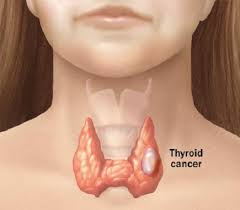- Home
- Editorial
- News
- Practice Guidelines
- Anesthesiology Guidelines
- Cancer Guidelines
- Cardiac Sciences Guidelines
- Critical Care Guidelines
- Dentistry Guidelines
- Dermatology Guidelines
- Diabetes and Endo Guidelines
- Diagnostics Guidelines
- ENT Guidelines
- Featured Practice Guidelines
- Gastroenterology Guidelines
- Geriatrics Guidelines
- Medicine Guidelines
- Nephrology Guidelines
- Neurosciences Guidelines
- Obs and Gynae Guidelines
- Ophthalmology Guidelines
- Orthopaedics Guidelines
- Paediatrics Guidelines
- Psychiatry Guidelines
- Pulmonology Guidelines
- Radiology Guidelines
- Surgery Guidelines
- Urology Guidelines
Cabozantinib a first line treatment option for differentiated thyroid cancer

In a trial by the Abramson Cancer Center and the Perelman School of Medicine at the University of Pennsylvania,it has been confirmed that cabozantinib could be a viable first line therapy option for patients with metastatic, radioactive iodine-resistant thyroid cancer.The drug made tumors shrunk in 34 out of 35 patients who took it, and more than half of those patients saw the tumor size decrease by more than 30 percent.
Researchers will present their findings at the 2018 Multidisciplinary Head and Neck Cancers Symposium in Scottsdale, Arizona this Friday.
Most cases of differentiated thyroid cancer are treated with radioactive iodine therapy. Since the thyroid absorbs nearly all of the iodine
in the human body, radioactive iodine given to a patient will concentrate in thyroid cancer cells, killing them with little effect on the rest of the body. The treatment can be curative, but about 15 percent of these patients have cancers that are resistant to the therapy. There are currently two approved treatments in these cases, both of which are kinase inhibitors - drugs that block enzymes that are crucial to a cancer cell's ability to function. However, responses to these treatments are not durable. Once patients progress, they need additional therapeutic options.
"Our trial shows that cabozantinib is an active agent for patients with RAI-refractory thyroid cancer and may be able to significantly improve the care of patients who are at this advanced stage of their disease," said the study's lead author Marcia S. Brose, MD PhD, an associate professor of Otorhinolaryngology: Head and Neck Surgery and director of the Center for Rare Cancers and Personalized Therapy at Penn.
As part of a phase II trial, Brose and her team gave the drug as a first line therapy to 35 patients with metastatic, radioactive iodine-resistant thyroid cancer starting in March of 2014. Thirty-four experienced tumor shrinkage, and 19 of the 35 (54 percent) achieved a partial response - defined as a shrinkage greater than 30 percent. The median time on the study was 35 weeks (range 3-197), and 16 patients are currently still enrolled. "These results indicate cabozantinib may offer an additional treatment option to these patients that will shrink tumors and provide an additional progression-free period for our patients," Brose said.
Twenty-three of the 35 patients (66 percent) required dose interruptions and dose adjustments during the trial. The most common toxicities attributable to cabozantinib included hyperglycemia, which presented in 28 patients (80 percent). Twenty-seven patients experienced diarrhea (77 percent), 26 had fatigue (74 percent), and 25 had weight loss (71 percent). Five patients experienced grade 3-5 hypertension (14 percent), 3 had grade 3-5 increase lipase (9 percent), 2 had grade 3-5 weight loss (6 percent), 2 had grade 3-5 pulmonary embolism (6 percent), and 2 had hyponatremia (6 percent).
Brose says the data show the need for a larger, multi-center study, plans for which are already underway.

Disclaimer: This site is primarily intended for healthcare professionals. Any content/information on this website does not replace the advice of medical and/or health professionals and should not be construed as medical/diagnostic advice/endorsement or prescription. Use of this site is subject to our terms of use, privacy policy, advertisement policy. © 2020 Minerva Medical Treatment Pvt Ltd